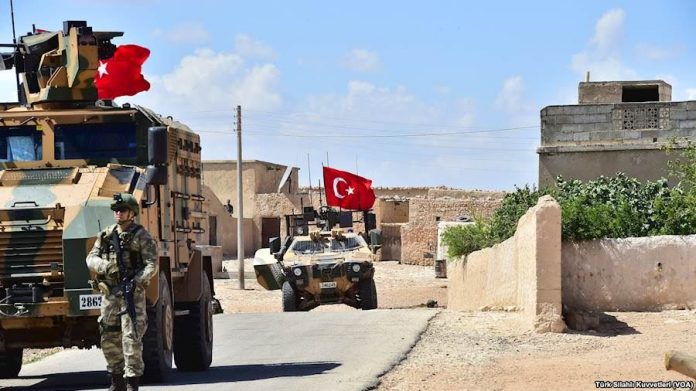The impotence of the Turkish army in the face of joint Russian-Syrian attacks in Idlib province underlines the extent to which the Turkish President, Recep Tayyip Erdogan, is more isolated than ever on the Syrian war front. It should be noted that on February 27, the Syrian army inflicted on Turkey its worst day of the conflict so far, when a Syrian army airstrike killed 33 Turkish soldiers in Idlib province. In response, Mr. Erdogan has decided to launch a military offensive against the Syrian army, entitled ‘Operation Spring Shield’.
Ankara calls for NATO solidarity
Faced with the precarious situation of the Turkish army in Idlib, where nearly 10,000 Turkish soldiers have been deployed without air cover since Russia has complete control over the Syrian airspace, Erdogan has sought to obtain solidarity from the transatlantic alliance by invoking Article 4 of NATO. This article stipulates that any ally can request consultations whenever, in the opinion of any of them, their territorial integrity, political independence or security is threatened.
However, relations between Turkey and its NATO allies have been tense since Erdogan chose to pursue a more assertive and pragmatic foreign policy. This was notable when the Turkish President took the decision to sign a $2.5 billion contract with Russia in December 2017 for the supply of Russian S-400 missile systems, which are incompatible with NATO’s defense system. Turkey’s three incursions into territories controlled by Kurdish forces in Syria and its questioning of the maritime borders in the eastern Mediterranean has underlined Erdogan’s determination to jeopardize the strategic interests of his western allies. Given that Turkey has become a problematic partner for the Alliance, it is unlikely that its allies would consider providing any military support in accordance with the gravity of the situation.
Pro-Turkish extremist groups pose a problem for Western support
The presence of jihadist organizations supporting Turkish forces against the Syrian regime is a real barrier to Western countries’ support for Turkey. Indeed, Idlib province is the last jihadist stronghold in Syria. The main force is Hayat Tahrir al-Sham (HTC), formerly known as the al-Nusra Front, the former Syrian branch of al-Qaeda in Syria, which is comprised of Syrian and foreign jihadists. HTC’s rival is the current armed wing of al-Qaeda in Syria, Tanzim Hurras ad-Din (Guardians of Religion Organisation), which is comprised of Syrian and former jihadists from the wars in Afghanistan and Iraq. It should be noted that there is also a cluster of small groups composed mainly of European fighters, notably Omar Omsen’s group, which includes several dozen French jihadists.
The absence of a clear policy regarding the repatriation of foreign fighters to stand trial for their atrocities in Western countries seems to mean, in the context of the Damascus regime’s offensive in Idlib province, that Turkey’s NATO allies would not be opposed to see these foreign fighters being killed on the front line. This should not be a surprise given that more than 5,000 European citizens have moved to the conflict zone. In the case of France, 350 French jihadists are in the enclave of Idlib. Although the estimated number of British jihadists in Idlib province is not known, it is estimated that about 360 of them are still in Syria.
However, if the fighting between Turkish and Syrian forces persist and intensifies, it is possible that it could lead to a new humanitarian catastrophe. Dissatisfied with the lack of support, particularly from European countries, Erdogan took the decision on February 28 to open Turkey’s borders with the European Union.
Although Britain has left the EU, it must join its European allies in condemning the actions of the Turkish President. Indeed, if Britain wants to be a major independent geopolitical actor, it must no longer allow itself to be held hostage to the threats and actions of the Turkish President. It is important that the British government pursues this position because a new EU migrant crisis could also affect Britain.
Perspective
At present, Turkey is clearly in a weak position in northwest Syria. This week the forces of the Assad regime succeeded in retaking the strategic town of Saraqeb from the rebel and Turkish forces. Saraqeb is of strategic importance because it is located at the junction of two key highways: the M5, which connects the capital Damascus with Aleppo, and the M4, which connects Aleppo with the coastal province of Latakia, which is an important stronghold of the Assad regime.
Erdogan’s geopolitical balancing strategy with the West and Russia has clearly not worked. Ankara has been clearly affected by the advancement of the Russian backed Assad regime in Idlib province. The Turkish President now has the difficult task of convincing the Russian President, Vladimir Putin, this Thursday in Moscow to commit the Kremlin to a lasting truce in Idlib province.
The views and opinions expressed in this article are those of the author.

The author has recently graduated with a Masters in International Relations from the University of New South Wales, Sydney, Australia. His research interests are focussed on geopolitical and security issues specific to the Middle East and their impact on European powers.


